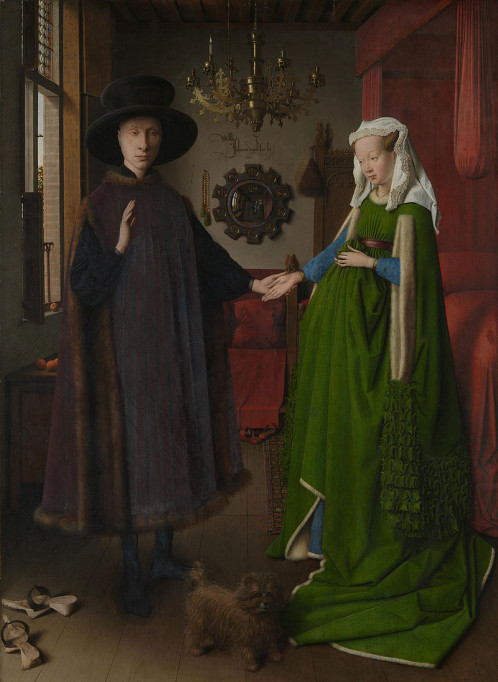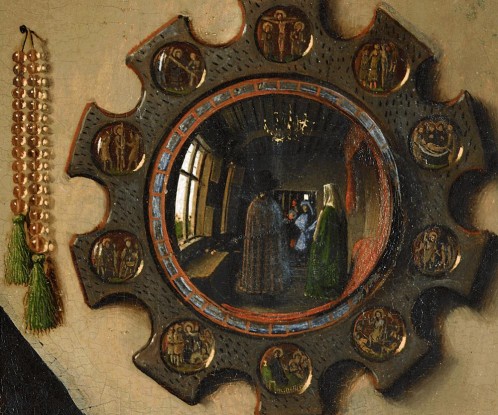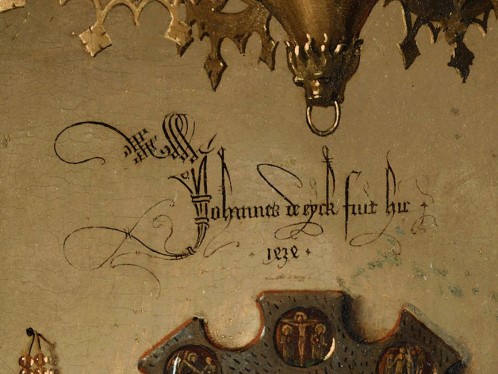The Arnolfini Wedding
Key Pieces series
With our ‘Key Piece’ this week we travel back to the 15th century with Jan van Eyck internationally renown The Arnolfini Wedding and the numerous mysteries that envelop the painting.
1. It was painted in 1434 by Flemish artist Jan van Eyck and his atelier.
2. It is one of the most complex painting of the Western Art because of its mysterious iconography.
3. The oil on oak panel supposedly depicts the Italian merchant Giovanni di Nicolao Arnolfini and his wife, presumably in their home in Bruges.
4. The painting is surprisingly small – 82,2 x 60 cm – compared to its many representations on posters and pictures.
5. The Arnolfini Wedding passed through several owners, among whom the sitters themselves, then Marguerite from Austria and Marie from Hungary, it was then offered to George IV in 1816 and in 1842 the London National Gallery bought it for 630 pounds. The painting can still be admired in the National Gallery today.
6. The mirror in the very center of the painting in the back of the room reflects the back of the Arnolfini and two figures in the doorway. One of them is Jan Van Eyck.
7. The deep perspective and self portrait incorporated in the painting by Van Eyck inspired Diego Velasquez’s Las Meninas.
8. The painting is the subject of many different interpretations among scholars. So far no real proof of the fact that it really is a portrait of the Arnolifini has been found.
9. It is an allegory of matrimony that might not represent existing characters as points out Art Historian Helen Gardner: ‘Almost every object depicted is in some way symbolic of the holiness of matrimony.’
10. The Arnolifni Wedding has been honored many times in popular culture, it is notably available in Lego figurines.



Archive
- Dezember 2016 (1)
- Oktober 2016 (3)
- September 2016 (24)
- Juli 2016 (20)
- Juni 2016 (24)
- Mai 2016 (18)
- April 2016 (18)
- März 2016 (21)
- Februar 2016 (11)
- Januar 2016 (20)
- Dezember 2015 (20)
- November 2015 (37)
- Oktober 2015 (30)
- September 2015 (24)
- August 2015 (4)
- Juli 2015 (30)
- Juni 2015 (9)
- Mai 2015 (17)
- April 2015 (23)
- März 2015 (18)
- Januar 2015 (8)
- Dezember 2014 (1)
- November 2014 (3)
- Oktober 2014 (10)
- September 2014 (4)
- August 2014 (2)
- Juli 2014 (3)
- Juni 2014 (2)
- Mai 2014 (5)
- April 2014 (11)
- März 2014 (12)
- Februar 2014 (13)
- Januar 2014 (10)
- Dezember 2013 (5)
- November 2013 (13)
- Oktober 2013 (24)
- September 2013 (18)
- August 2013 (26)
- Juli 2013 (13)
- Juni 2013 (35)
- Mai 2013 (44)
- April 2013 (49)
- März 2013 (61)
- Februar 2013 (54)
- Januar 2013 (46)
- Dezember 2012 (50)
- November 2012 (58)
- Oktober 2012 (62)
- September 2012 (61)
- August 2012 (63)
- Juli 2012 (64)
- Juni 2012 (61)
- Mai 2012 (63)
- April 2012 (51)
- März 2012 (67)
- Februar 2012 (37)



